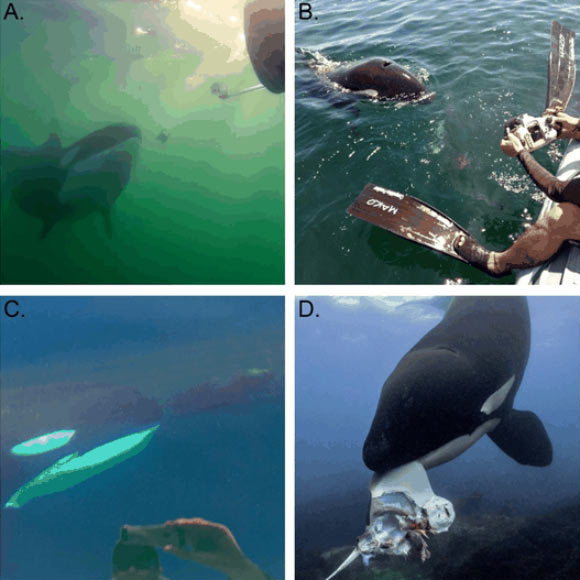In a paper published online in the Journal of Comparative Psychology, marine biologists report on 34 interactions spanning two decades in which killer whales (Orcinus orca) in the wild attempted to offer food to humans. The incidents took place in oceans around the world, from California to New Zealand to Norway to Patagonia. The killer whales offered a total of 18 species were: six fishes, five mammals, three invertebrates, two birds, one reptile, and one seaweed. The authors suggest these cases may be representative of interspecific generalized altruism.

The cases presented by Towers et al. are among the first recorded where wild killer whales (Orcinus orca) used prey and other items to instigate interactions with humans. Image credit: Towers et al., doi: 10.1037/com0000422.
Altruistic behaviors such as prey sharing are prosocial acts that can instigate and perpetuate various forms of reciprocity.
Subsequent relationship dynamics provide a foundation for the evolution of societal norms and associated encephalization in social species, like primates and dolphins.
Some cultures within these families benefit from interactions with other mammal species but accounts of any wild animals attempting to provision humans are extremely rare.
“Orcas often share food with each other — it’s a prosocial activity and a way that they build relationships with each other,” said Dr. Jared Towers, a researcher at Bay Cetology.
“That they also share with humans may show their interest in relating to us as well.”
Dr. Towers and his colleagues, Dr. Ingrid Visser from the Orca Research Trust and Dr. Vanessa Prigollini of the Marine Education Association, collected and analyzed information about 34 incidents of food sharing that they and others had experienced.
On 11 of the occasions, the people were in the water when the killer whales approached them, in 21 cases they were on boats, and in two cases they were on the shore.
Some were captured on video and in photos, others were described in interviews with the researchers.
In order to be included in the analysis, the incidents had to meet strict criteria — in each case the whales had to have approached the people on their own and dropped the item in front of them.
In all but one of the cases, the killer whales waited to see what would happen after they made the offering, and in seven cases they tried more than once to offer the food, after the people initially refused it.
“Domesticated animals like dogs and cats sometimes offer food to humans, but this research marks some of the first detailed descriptions of similar behavior in non-domesticated animals,” the scientists said.
“It makes sense because killer whales are intelligent and social animals that use food sharing as a way to build relationships with kin and unrelated individuals.”
“They also often hunt prey much larger than themselves, and thus sometimes have food to spare.”
“Offering items to humans could simultaneously include opportunities for killer whales to practice learned cultural behavior, explore or play and in so doing learn about, manipulate or develop relationships with us.”
“Giving the advanced cognitive abilities and social, cooperative nature of this species, we assume that any or all these explanations for, and outcomes of such behavior are possible.”
_____
J.R. Towers et al. 2025. Testing the waters: Attempts by wild killer whales (Orcinus orca) to provision people (Homo sapiens). Journal of Comparative Psychology, in press; doi: 10.1037/com0000422
